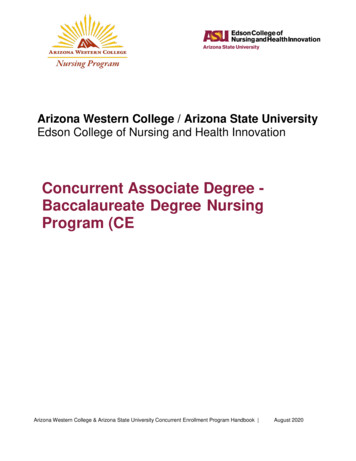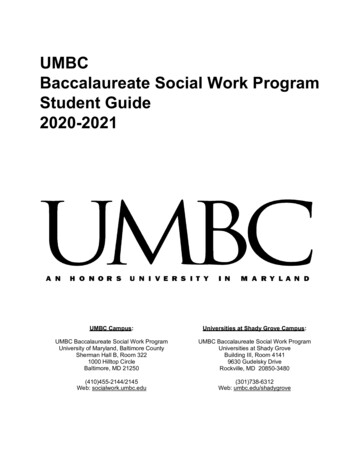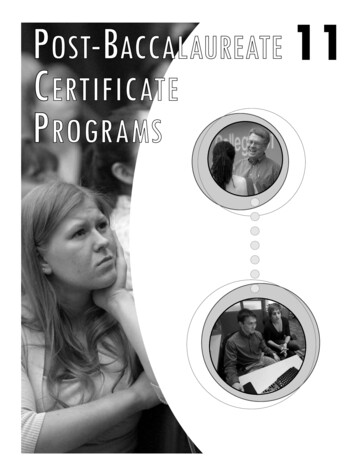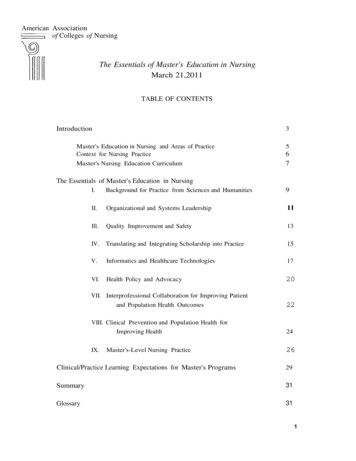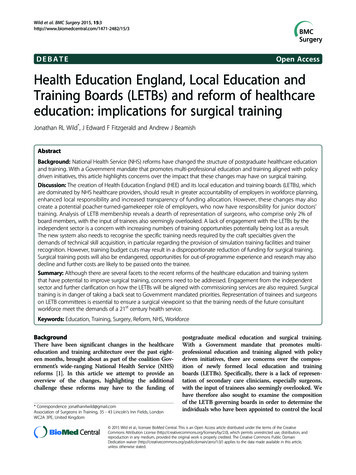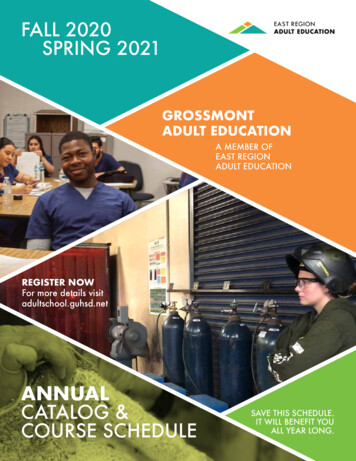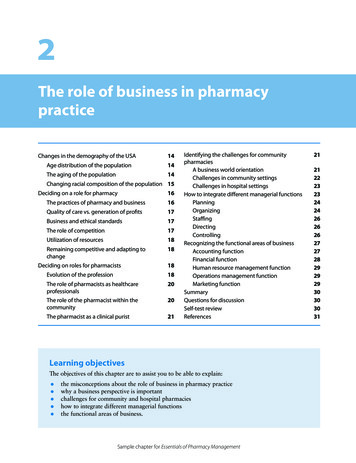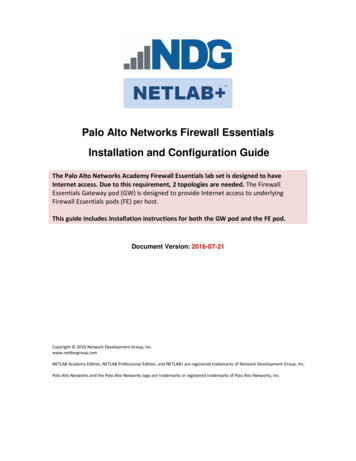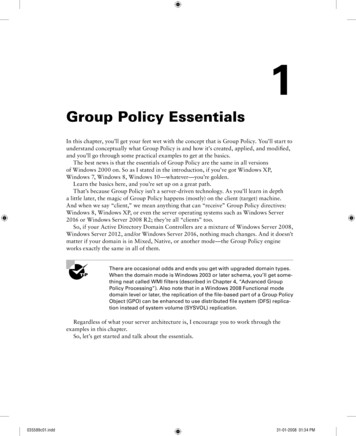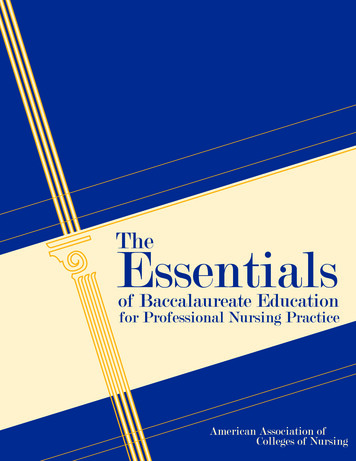
Transcription
The Essentials of Baccalaureate Educationfor Professional Nursing PracticeOctober 20, 2008TABLE OF CONTENTSExecutive Summary3BackgroundNursing EducationThe Discipline of NursingAssumptionsRoles for the Baccalaureate Generalist NursePreparation for the Baccalaureate Generalist Nurse:Components of the Essentials56788The Essentials of Baccalaureate Education for Professional Nursing PracticeI.Liberal Education for Baccalaureate Generalist Nursing PracticeII.Basic Organizational and Systems Leadership forQuality Care and Patient Safety101013III. Scholarship for Evidence Based Practice15IV. Information Management and Application of PatientCare Technology17V.20Healthcare Policy, Finance, and Regulatory EnvironmentsVI. Interprofessional Communication and Collaboration forImproving Patient Health Outcomes22VII. Clinical Prevention and Population Health23VIII. Professionalism and Professional Values26IX. Baccalaureate Generalist Nursing Practice29Expectations for Clinical Experiences within the Baccalaureate Program331
Summary35Glossary36References40Appendix A: Task Force on the Revision of the Essentials of BaccalaureateEducation for Professional Nursing Practice45Appendix B: Consensus Process to Revise the Essentials of BaccalaureateEducation for Professional Nursing Practice46Appendix C: Participants who Attended Stakeholder Meetings47Appendix D: Schools of Nursing that Participated in the Regional Meetings49Appendix E: Professional Organizations that Participated in the Regional Meetings60Appendix F: Healthcare Systems that Participated in the Regional Meetings612
Executive SummaryThe Essentials of Baccalaureate Educationfor Professional Nursing Practice (2008)This Essentials document serves to transform baccalaureate nursing education by providingthe curricular elements and framework for building the baccalaureate nursing curriculum forthe 21st century. These Essentials address the key stakeholders’ recommendations andlandmark documents such as the IOM’s recommendations for the core knowledge required ofall healthcare professionals. This document emphasizes such concepts as patient centeredcare, interprofessional teams, evidence based practice, quality improvement, patient safety,informatics, clinical reasoning/critical thinking, genetics and genomics, cultural sensitivity,professionalism, and practice across the lifespan in an ever changing and complex healthcareenvironmentEssentials I IX delineate the outcomes expected of graduates of baccalaureate nursingprograms. Achievement of these outcomes will enable graduates to practice within complexhealthcare systems and assume the roles: provider of care; designer/manager/coordinator ofcare; and member of a profession. Essential IX describes generalist nursing practice at thecompletion of baccalaureate nursing education. This Essential includes practice focusedoutcomes that integrate the knowledge, skills, and attitudes delineated in Essentials I – VIII.The time needed to accomplish each Essential will vary, and each Essential does not require aseparate course for achievement of the outcomes.The nine Essentials are:· Essential I: Liberal Education for Baccalaureate Generalist Nursing Practiceo A solid base in liberal education provides the cornerstone for the practice andeducation of nurses.· Essential II: Basic Organizational and Systems Leadership for Quality Care andPatient Safetyo Knowledge and skills in leadership, quality improvement, and patient safety arenecessary to provide high quality health care.· Essential III: Scholarship for Evidence Based Practiceo Professional nursing practice is grounded in the translation of current evidenceinto one’s practice.· Essential IV: Information Management and Application of Patient Care Technologyo Knowledge and skills in information management and patient care technology arecritical in the delivery of quality patient care.· Essential V: Health Care Policy, Finance, and Regulatory Environmentso Healthcare policies, including financial and regulatory, directly and indirectlyinfluence the nature and functioning of the healthcare system and thereby areimportant considerations in professional nursing practice.· Essential VI: Interprofessional Communication and Collaboration for ImprovingPatient Health Outcomeso Communication and collaboration among healthcare professionals are critical todelivering high quality and safe patient care.3
···Essential VII: Clinical Prevention and Population Healtho Health promotion and disease prevention at the individual and population levelare necessary to improve population health and are important components ofbaccalaureate generalist nursing practice.Essential VIII: Professionalism and Professional Valueso Professionalism and the inherent values of altruism, autonomy, human dignity,integrity, and social justice are fundamental to the discipline of nursing.Essential IX: Baccalaureate Generalist Nursing Practiceo The baccalaureate graduate nurse is prepared to practice with patients,including individuals, families, groups, communities, and populations acrossthe lifespan and across the continuum of healthcare environments.o The baccalaureate graduate understands and respects the variations of care,the increased complexity, and the increased use of healthcare resourcesinherent in caring for patients.Learning opportunities, including direct clinical experiences, must be sufficient inbreadth and depth to ensure the baccalaureate graduate attains these practice focusedoutcomes and integrates the delineated knowledge and skills into the graduate’sprofessional nursing practice. Clinical learning is focused on developing and refining theknowledge and skills necessary to manage care as part of an interprofessional team.Simulation experiences augment clinical learning and are complementary to direct careopportunities essential to assuming the role of the professional nurse. A clinicalimmersion experience provides opportunities for building clinical reasoning,management, and evaluation skills.4
IntroductionThe Essentials of Baccalaureate Education for Professional Nursing Practice providesthe educational framework for the preparation of professional nurses. This documentdescribes the outcomes expected of graduates of baccalaureate nursing programs.The Essentials apply to all pre licensure and RN completion programs, whether thedegree is baccalaureate or graduate entry. Program curricula are designed to preparestudents to meet the end of program outcomes delineated under each Essential.BackgroundThe healthcare delivery system has changed dramatically since The Essentials ofBaccalaureate Education for Professional Nursing Practice was endorsed by theAmerican Association of Colleges of Nursing (AACN, 1998). Building a saferhealthcare system has become the focus of all health professions following numerousreports from the Institute of Medicine (IOM, 2000, 2001, 2004), American HospitalAssociation (2002), Robert Wood Johnson Foundation (Kimball & O’Neill, 2002), theJoint Commission (2002) and other authorities. Nursing has been identified as having thepotential for making the biggest impact on a transformation of healthcare delivery to asafer, higher quality, and more cost effective system. With the increasing awareness ofthe need for change in the healthcare system, the clinical microsystems (small, functionalunits where care is provided within the larger system) have become an important focusfor improving healthcare outcomes (Nelson, Batalden, & Godfrey, 2007).In addition to the concern over healthcare outcomes, the United States and the globalmarket are experiencing a nursing shortage that is expected to intensify as the demand formore and different nursing services grows. Buerhaus, Staiger, and Auerbach (2008)reported that the U.S. may experience a shortage of more than 500,000 registered nursesby the year 2025. Despite annual increases in enrollments in entry level baccalaureatenursing programs since 2001 (Fang, Htut, & Bednash, 2008), these increases are notsufficient to meet the projected demand for nurses. According to Buerhaus et al. (2008),enrollment in nursing programs would have to increase at least 40% annually to replacethe nurses expected to leave the workforce through retirement alone. Addressing the needfor an increased number of baccalaureate prepared nurses is critical but not sufficient.Nursing must educate future professionals to deliver patient centered care as members ofan interprofessional team, emphasizing evidence based practice, quality improvementapproaches, and informatics (IOM, 2003b). Nursing education and practice must worktogether to better align education with practice environments (Joint Commission, 2002,Kimball & O’Neill, 2002;).The environments in which professional nurses practice have become more diverse andmore global in nature. Scientific advances, particularly in the areas of genetics and5
genomics, have had and will continue to have a growing and significant impact onprevention, diagnosis, and treatment of diseases, illnesses, and conditions. The increasedprevalence of chronic illness is a result of an increasingly older adult population,environmental threats, lifestyles that increase risk of disease, and enhanced technologicaland therapeutic interventions that prolong life. Increases in longevity of life have madethe older adult the fastest growing segment of the population. In 2003, 12 % of thepopulation was older than 65 years of age. By 2030, this population will increase to 20%,with a large majority older than 80 years of age (He, Sengupta, Velkoff, & DeBarros,2005). Those older than 65 years of age had almost four times the number ofhospitalization days than those younger than 65 years of age (Centers for DiseaseControl, 2007)Education for the baccalaureate generalist must include content and experiences acrossthe lifespan, including the very young who are especially vulnerable. The percentage ofthe population under 18 years of age is 24.6% (U.S. Census Bureau, 2008). U.S. infantmortality in 2006 ranked 38th in the world (World Health Organization, 2008).Prevention is critical in addressing both acute and chronic conditions across the lifespan.The role of the nurse in prevention continues to be of utmost importance.Increasing globalization of healthcare and the diversity of this nation’s populationmandates an attention to diversity in order to provide safe, high quality care. Theprofessional nurse practices in a multicultural environment and must possess the skills toprovide culturally appropriate care. According to the U.S. Census Bureau (2008), thenation's minority population totaled 102 million or 34% of the U.S. population in 2006.With projections pointing to even greater levels of diversity in the coming years,professional nurses need to demonstrate a sensitivity to and understanding of a variety ofcultures to provide high quality care across settings. Liberal education, including thestudy of a second language, facilitates the development of an appreciation for diversity.Strong forces influencing the role of nurses include:· scientific advances, particularly in the area of genetics and genomics,· changing demographics of patient populations,· new care technologies, and· patient access to healthcare information.These forces call for new ways of thinking and providing health care. Nursing isuniquely positioned to respond to these major forces, requiring an increased emphasis ondesigning and implementing patient centered care, developing partnerships with thepatient, and a focus on customer service.Nursing EducationIn response to calls for transforming the healthcare system and how healthcareprofessionals are educated, AACN has maintained an ongoing dialogue with a broadrepresentation of stakeholders internal and external to nursing. The dialogue has focusedon the knowledge, skills, and attitudes needed by nurses to practice effectively within this6
complex and changing environment. New innovative models of nursing education haveemerged, and AACN has taken a leadership role in crafting a preferred vision for nursingeducation.In 2004, the AACN Board of Directors reaffirmed its position that baccalaureateeducation is the minimum level required for entry into professional nursing practice intoday’s complex healthcare environment. Baccalaureate generalist education, as definedin this document, is the foundation upon which all graduate nursing education builds.The preferred vision for nursing education includes generalist, advanced generalist, andadvanced specialty nursing education. Generalist nurse education occurs at a minimum inbaccalaureate degree nursing programs. Advanced generalist education occurs inmaster’s degree nursing programs, including the Clinical Nurse Leader (CNL ), which isan advanced generalist nursing role. Advanced specialty education occurs at the doctorallevel in Doctor of Nursing Practice (DNP) or research focused degree programs (PhD,DNS, or DNSc). End of program outcomes for the baccalaureate, master’s, and doctoralnursing programs build on each other.The Discipline of NursingRoles for the baccalaureate generalist nurse are derived from the discipline of nursing.The roles of the baccalaureate generalist include:· provider of care,· designer/manager/coordinator of care, and· member of a profession.Nursing generalist practice includes both direct and indirect care for patients, whichincludes individuals, families, groups, communities, and populations. Nursing practice isbuilt on nursing knowledge, theory, and research. In addition, nursing practice derivesknowledge from a wide array of other fields and professions, adapting and applying thisknowledge as appropriate to professional practice.In the senior college and university setting, every academic discipline is grounded indiscrete inquiry based applications that are distinctive to that discipline. Scientificadvances, (particularly in the area of genetics and genomics), changing demographics ofpatient populations, new care technologies, and patient access to health care informationcall for new ways of thinking and doing in the provision of health care. The academicsetting provides a forum for contemplating physical, psychological, social, cultural,behavioral, ethical, and spiritual problems within and across disciplines. Faculty have aresponsibility to facilitate the translation of knowledge from a liberal education base intothe practice of nursing. Nursing faculty introduce nursing science and theories, and guidethe student in developing an understanding of the discipline of nursing’s distinctiveperspective.Baccalaureate prepared nurses provide patient centered care that identifies, respects, andaddresses patients’ differences, values, preferences, and expressed needs (IOM, 2003a).Patient centered care also involves the coordination of continuous care, listening to,7
communicating with, and educating patients and caregivers regarding health, wellness,and disease management and prevention. The generalist nurse provides the human linkbetween the healthcare system and the patient by translating the plan of care to thepatient. A broad based skill set is required to fill this human interface role. Patient centered care also requires the development of a nurse patient partnership. Patients, asconsumers of healthcare services, and as integral members of the healthcare team, havean increasing role and responsibility for the mutual planning of care and healthcaredecision making.The fundamental aspects of generalist nursing practice are: direct care of the sick in andacross all environments, health promotion and clinical prevention, and population basedhealth care. A defining feature of professional nursing practice is the focus on healthpromotion and risk reduction. Advances in science and technology will continue toemerge, which will help to predict future health problems. Nurses will design andimplement measures to modify risk factors and promote healthy lifestyles. These sameadvances in science and technology also have allowed individuals to live longer and oftenwith increasing numbers of chronic illnesses and conditions. With an increasing emphasison cost savings and cost benefits, nurses will play a leading role in the provision of care.AssumptionsThe baccalaureate generalist graduate is prepared to:· practice from a holistic, caring framework;· practice from an evidence base;· promote safe, quality patient care;· use clinical/critical reasoning to address simple to complex situations;· assume accountability for one’s own and delegated nursing care;· practice in a variety of healthcare settings;· care for patients across the health illness continuum;· care for patients across the lifespan;· care for diverse populations;· engage in care of self in order to care for others; and· engage in continuous professional development.Roles for the Baccalaureate Generalist NurseBaccalaureate Generalist nurses are providers of direct and indirect care. In this role,nurses are patient advocates and educators. Historically, the nursing role has emphasizedpartnerships with patients – whether individuals, families, groups, communities, orpopulations – in order to foster and support the patient’s active participation indetermining healthcare decisions. Patient advocacy is a hallmark of the professionalnursing role and requires that nurses deliver high quality care, evaluate care outcomes,and provide leadership in improving care.8
Changing demographics and ongoing advances in science and technology are a reality ofhealthcare practice. The generalist nurse provides evidence based care to patients withinthis changing environment. This clinician uses research findings and other evidence indesigning and implementing care that is multi dimensional, high quality, and cost effective. The generalist nurse also is prepared for the ethical dilemmas that arise inpractice and will be able to make and assist others in making decisions within aprofessional ethical framework. Understanding advances in science and technology andthe influence these advances have on health care and individual well being is essential.Understanding patients and the values they bring to the healthcare relationship is equallyimportant.The generalist nurse practices from a holistic, caring framework. Holistic nursing care iscomprehensive and focuses on the mind, body, and spirit, as well as emotions. Thegeneralist nurse recognizes the important distinction between disease and the individual’sillness experience. Assisting patients to understand this distinction is an important aspectof nursing. In addition, nurses recognize that determining the health status of the patientwithin the context of the patient’s values is essential in providing a framework forplanning, implementing, and evaluating outcomes of care.The generalist nurse provides care in and across all environments. Nurses focus onindividual, family, community, and population health care, as they monitor and manageaspects of the environment to foster health.Baccalaureate generalist nurses are designers, coordinators, and managers of care. Thegeneralist nurse, prepared at the baccalaureate degree level, will have the knowledge andauthority to delegate tasks to other healthcare personnel, as well as to supervise andevaluate these personnel. As healthcare providers who function autonomously andinterdependently within the healthcare team, nurses are accountable for their professionalpractice and image, as well as for outcomes of their own and delegated nursing care.Nurses are members of healthcare teams, composed of professionals and other personnelthat deliver treatment and services in complex, evolving healthcare systems. Nurses bringa unique blend of knowledge, judgment, skills, and caring to the healthcare team.Baccalaureate generalist nurses are members of the profession and in this role areadvocates for the patient and the profession. The use of th
for Professional Nursing Practice . o A solid base in liberal education provides the cornerstone for the practice and . Essential IV: Information Management and Application of Patient Care Technology o Knowledge and skills in information
